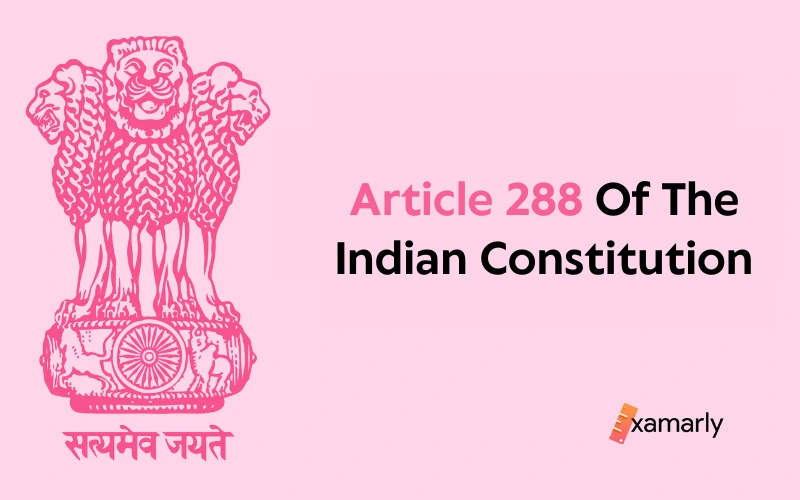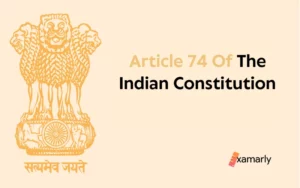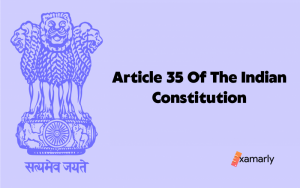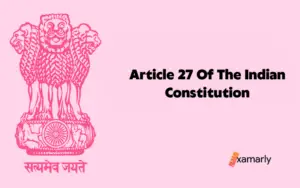An Overview
The provision for exemption from taxation by the States in respect of water or electricity is an important aspect of the financial relations between the Union and the States in India.
Article 288 of the Indian Constitution prohibits the States from imposing a tax on the sale or purchase of water or electricity, except in cases where the President of India allows doing so by means of a law.
In this blog, we will delve into the details of this provision such as its background and explanation of its clauses, including the exceptions to the prohibition on taxation by the States and the powers of the Parliament to formulate any law for the levying of taxes on water or electricity.
We will also discuss the implications of this provision for the maintenance and development of water and electricity infrastructure in the country and answer some frequently asked questions related to Article 288 of the Indian Constitution.
- An Overview
- Background Of Article 288 Of The Indian Constitution
- What Does Article 288 Of The Indian Constitution Deal With?
- Clause (1) Of Article 288 Of The Indian Constitution: Explained
- Clause (2) Of Article 288 Of The Indian Constitution: Explained
- Summing Up
- FAQs Related To Article 288 Of The Indian Constitution
- What Are The Different Types Of Taxes Levied Under The Constitution Of India?
- What Is The Purpose Of Article 288 Of The Indian Constitution?
- What Kind Of Taxation Does Clause (1) Of Article 288 Of The Indian Constitution Talk About?
- Whose Approval Is Required As Per Clause (2) Of Article 288 Of The Indian Constitution?
- When Was The Draft Article For Article 288 Of The Indian Constitution Debated And Adopted In The Constitution Of India?
Background Of Article 288 Of The Indian Constitution
Before digging into the details of Article 288, let us first familiarise ourselves with its background in a brief manner.
- Draft Article 265A for Article 288 of the Indian Constitution was discussed in the Constituent Assembly on September 9, 1949.
- It was not originally part of the plan for the Draft Constitution of India in 1948. However, the Chairman of the Drafting Committee suggested to add Draft Article 285A that would follow Draft Article 265A.
- The Draft Article says that any State government can not make a law that allows them to tax water or electricity. This includes water or electricity that is stored, made, used, sent out or sold by any organisation that is set up by the Parliament for managing or improving any river or river-valley that is shared between the States.
- If any State government does make such a law, it would not be valid unless it is approved by the President of India.
- The Draft Article that was suggested was accepted by the members of the Assembly without any objection or discussion on the September 9, 1949.
What Does Article 288 Of The Indian Constitution Deal With?
The provisions held in the clauses of Article 288 revolve around the exemption from taxes. This exemption from tax by the States, particularly is related to taxation on water and electricity in specific cases.
The article involves two clauses, namely- clause (1) and clause (2). These have been quoted from the official document of the Constitution of India. Each of the clauses will be taken up one at a time. We will try to analyse the provisions that are mentioned in the scope of the article.
Clause (1) Of Article 288 Of The Indian Constitution: Explained
Exemption from taxation by States in respect of water or electricity in certain cases.—
(1) Save in so far as the President may by order otherwise provide, no law of a State in force immediately before the commencement of this Constitution shall impose, or authorise the imposition of, a tax in respect of any water or electricity stored, generated, consumed, distributed or sold by any authority established by any existing law or any law made by Parliament for regulating or developing any inter-State river or river-valley.
Explanation.—The expression “law of a State in force” in this clause shall include a law of a State passed or made before the commencement of this Constitution and not previously repealed, notwithstanding that it or parts of it may not be then in operation either at all or in particular areas.
The first clause of Article 288 of the Indian Constitution explains that no State legislation or law made by the exercising of authority of the State government, that was in effect immediately prior to the start of this Constitution may impose, or approve the imposition of levying of a tax on any water or electricity. This clause takes into account such water and electricity that is stored, produced, consumed, distributed, or sold by any authority formed by any existing law or any law passed by Parliament.
The Parliament has the power vested upon it to formulate laws for the purpose of controlling or developing any inter-State river or river valley. The only exception to this rule is if the President of India decides to make a different provision by an exclusive order.
In simple words, we can say that, except for instances wherein the President may, by means of giving an order otherwise provide, no law of the Legislature of a State, will impose, or allow the imposition of, a tax on any water or electricity. The water or electricity in question is one that is stored, produced, used, distributed, or sold by any agency that came into existence by law. The previous line talks about any such law that is valid in the present time or any law adopted by the Parliament with the purpose of controlling or developing any inter-State river or river-valley. The above clause takes into consideration the laws formulated due to the powers of the State Legislature that came into effect immediately before the beginning of the Indian Constitution.
A point to be noted here is that the official document also provides an explanation that follows the text of the clause. This explanation sheds light on the fact that in this clause, the expression “law of a State in force” refers to a law that was passed or made before the beginning of this Constitution.
Also, it must be ensured that the said law has not been previously repealed, despite the fact that it or parts of it may not have been in operation at the time. This could be either in its entirety or in certain portions. This provision applies even if the law was passed or made before the beginning of this Constitution.
Clause (2) Of Article 288 Of The Indian Constitution: Explained
(2) The Legislature of a State may by law impose, or authorise the imposition of, any such tax as is mentioned in clause (1), but no such law shall have any effect unless it has, after having been reserved for the consideration of the President, received his assent; and if any such law provides for the fixation of the rates and other incidents of such tax by means of rules or orders to be made under the law by any authority, the law shall provide for the previous consent of the President being obtained to the making of any such rule or order.
The second clause of Article 288 of the Indian Constitution states that the Legislature of a State may, by its powers of legislation, impose or allow the imposition of any such tax that is indicated in the first clause of this article. However, no such law may be of any use until it has gained the consent of the President of India, after having been reserved for his opinion.
If any such legislation exists that provides for the fixing of the rates and other aspects of such a tax with the help of rules or orders that are to be established under the law by any authority, then the law must state that the prior assent of the President must be acquired before establishing any such rule or order.
You Might Also Like:
| Article 284 Of The Indian Constitution | Article 285 Of The Indian Constitution |
| Article 286 Of The Indian Constitution | Article 287 Of The Indian Constitution |
Summing Up
After making ourselves familiar with the details about Article 288, we can come to some conclusions. They have been listed below.
- Article 288 of the Indian Constitution deals with the prohibition on States from imposing a tax on water or electricity stored, generated, consumed, distributed, or sold by any authority established by an existing law or a law made by the Parliament for regulating or developing any inter-State river or river-valley.
- The President of India has the power to exempt certain cases from this prohibition by issuing an order.
- The clauses of Article 288 provide that with the power of the Legislature of a State to impose or authorise the imposition of a tax on water or electricity. However, such a law can only be effective if it has received the approval of the President of India after being reserved for his consideration.
- If the law provides for the fixation of the rates and other incidents of the tax through rules or orders to be made under the law by any authority, then the law must also provide for the prior consent of the President of India to be obtained before making such rules or orders.
FAQs Related To Article 288 Of The Indian Constitution
What Are The Different Types Of Taxes Levied Under The Constitution Of India?
Income tax, customs charges, central excise duty, and any other applicable taxes are collected by the Central Government.
The State Government collects a variety of taxes, including taxes on agricultural income, taxes on professionals, taxes on state excise duty, taxes on value-added products, and so on. Taxes, such as those on water and property, are collected by the various local municipal bodies.
What Is The Purpose Of Article 288 Of The Indian Constitution?
The primary purpose of Article 288 of the Indian Constitution is to include in the purview of its provisions, the certain circumstances wherein the State governments are not permitted to levy sales taxes or other types of taxes on water or electricity.
The article is further divided into two clauses. These clauses provide the terms and conditions associated with the provision of this article.
What Kind Of Taxation Does Clause (1) Of Article 288 Of The Indian Constitution Talk About?
Clause (1) of Article 288 of the Indian Constitution takes into consideration the taxation or the imposition of taxation on water or electricity that has been stored, produced, consumed, distributed, or sold by any authority formed by any existing law or any law passed by Parliament.
Whose Approval Is Required As Per Clause (2) Of Article 288 Of The Indian Constitution?
According to clause (2) of Article 288 of the Indian Constitution, the approval of the President of India is required for the passing of any law for the fixing of the rates and other aspects with the help of rules or orders that are to be established under the law by any authority for the purpose of levying such a tax that is mentioned in the first clause of this article.
When Was The Draft Article For Article 288 Of The Indian Constitution Debated And Adopted In The Constitution Of India?
The Draft Article for Article 288 of the Indian Constitution was introduced and discussed in the Constituent Assembly On September 9, 1949. It was adopted into the Constitution of India on the same day itself.






